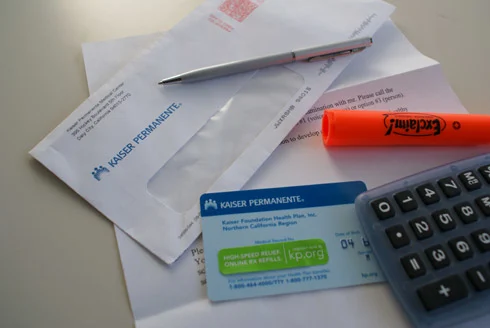
Get rid of your debt faster with debt relief
Choose your debt amount
Or speak to a debt consultant 844-731-0836
- 6 min read
4 Ways to Consolidate Medical Debt
Medical debt can cause finances to fall apart. It’s important to figure out a strategy for taking care of both your medical debt and your normal bills. Examine your cash-flow, credit, and assets to find the best solution for your situation.
The best way to handle medical debt is to avoid it in the first place. For a non-emergency procedure, talk to your medical provider about your insurance and what it does and doesn’t cover, if you qualify for any type of charity or patient financial assistance, and if you qualify for Medicaid or Medicare. Read the Bills.com article Handle Medical Bills to learn how to prevent medical debt.
Consolidate Debt With Medical Bills
People consolidate debt by combining several debts into one payment. Debt consolidations can mean a loan, consumer credit counseling, or a negotiated debt settlement program. If you are considering one of these three strategies, consider bankruptcy, too.
Let’s look at each strategy and the positives and negatives of each for consolidating medical debt.
Debt Consolidation Loan
A debt consolidation loan pays off your debts in favor of one, long-term, low-interest (hopefully) loan. Most debt consolidation loans are cash-out home loan refinances, although you can find five other consolidation loan options.
Pros
- You repay the debts consolidated immediately. If you owed money to a doctor, this maintains a positive relationship with your healthcare provider(s).
- Neutral or positive credit score impact, assuming you make the payments on your consolidation loan on time.
- One payment instead of several.
Cons
- Generally, the longer the loan term, the more you pay in interest.
- A cash-out mortgage refinance may increase your monthly home loan payments.
- You need a high credit score, a consistent income history, and low debt to qualify for a loan.
ready to shop for a home loan refinance? get pre-screened quotes from bills.com lending partners to learn the best rates available today.
Consider a consolidation loan if you ran the numbers on your budget and can afford the monthly loan payment. Look at a cash-out refinance if you are house rich but cash poor.
Debt Settlement
Rather than make monthly payments to your creditors, debt settlement programs negotiate lump-sum settlements with your creditors. These plans typically reduce your debt by 50% to 60% of your principal balances, though results vary. Debt settlement takes 24 to 36 months to complete, so this can be a good option to obtain debt freedom in a speedy manner.
Debt settlement has a proven track record with credit card debt. Your debt settlement provider will be able to give you fair forecast as to the amount each of your credit card accounts will settle for. Debt settlement companies that accept medical debt have less history with medical accounts. However, we know medical debts are trickier to negotiate than credit card debt.
We asked a negotiator at a leading debt settlement company why medical debt is tougher than credit card debt. He said there are two reasons medical debt is different from other unsecured personal debt. "First, they generally keep all of their collections ‘in house.’ This is especially true with regional clinics and hospitals). Consequently, they continue to collect on a debt for as long as they are legally allowed." The tendency for local and regional clinics and hospitals is to collect up to the state statute of limitations clock runs out.
"Second, a medical bill usually represents several entities within that medical care facility, such as the x-ray technician, the anesthesiologist, and so on," he said. "All have their part of the bills rolled up into the collective, and none of them want to take a pay cut for their services."
You can consolidate medical debt in a debt settlement program, the negotiator said, but you should expect the medical negotiations to take longer than the negotiations for credit card debt.
Pros
- Short time to debt freedom
- Generally, lower monthly payment
- Ability to consolidate credit card and medical debt
- Long-term benefit to credit profile
- No minimum credit score: Anyone with income qualifies
Cons
- Short-term harm to credit score while in plan
- Possibility creditor may litigate
- Not all debt settlement companies accept medical debt: Find one that does
Unsure how to consolidate medical debt? Talk to a Bills.com debt resolution partner to explain your situation and goals, and which strategy will work best for you.
Consider debt settlement if you have overwhelming credit card and medical debt, have regular income, and can afford to make a monthly payment to settle your debts.
Consumer Credit Counseling Service
Consumer credit counseling services (CCCS) offer financial counseling, budget planning, and creation of a Debt Management Plan. The CCCS provider divies-up your monthly payment according to the DMP, and pays an amount to each creditor enrolled.
DMPs are designed to pay-off 100% of the balance due on credit card debt. It is unclear if consumers can include non-negotiated medical debt to a DMP, or which CCCS providers accept medical debt. Pin the CCCS provider down on this issue before enrolling in a DMP.
Pros
- No minimum credit score: Anyone with income qualifies.
- Neutral to positive impact to credit score upon program completion
- Because you repay 100% of balance due, you maintain a positive relationship with creditor
- Few contact from creditors once program is underway
- Low chance of litigation
Cons
- Most DMPs take 5 years to complete
- Short-term harm to credit score while in plan
- CCCS provider may not accept medical debt
- High monthly payment: Typically 3% of your balance due
Make sure you can afford the DMP monthly payments before you commit to this option. Read the Bills.com article Credit Counseling – Will it Work? to learn more.
Bankruptcy
Bankruptcy is your best alternative if you find credit counseling and debt settlement are not feasible. There are two types of bankruptcy: Chapter 7 and chapter 13. If you qualify for a chapter 7, all of your eligible debts are discharged (cancelled) by the court. A chapter 13 is called a wage earner’s plan. In a chapter 13, people with regular income are put on court-supervised a plan to repay all or part of their debts over 3 to 5 years. At the end of the payment plan, the court usually discharges the remaining debt.
Pros
- No minimum credit score: Anyone with income qualifies.
- Stops existing and planned lawsuits while under bankruptcy court's protection
- Wipes out large sums of eligible debt quickly
- Most debts eligible for bankruptcy discharge, including medical debt
- Chapter 7 is very fast at a low cost
- Chapter 13 creates affordable payments
Cons
- Harsh short- and medium-term impact on credit score
- Can make you ineligible for an FHA loan for 2+ years
- Medical provider with discharged debt may refuse service to you in future
- Bankruptcy filing is public information
Bankruptcy is usually the best choice if you face overwhelming debt you cannot realistically hope to pay, or received notice of a lawsuit. Consult with a bankruptcy lawyer to learn if bankruptcy is a wise choice. Read more about bankruptcy to understand its process and the distinction between chapter 7 and chapter 13.
Unsure how to handle your debt? Let the Bills.com Debt Coach tool give you a customized report on your options to consolidate your debt with bad credit. It’s free!
Bills Action Plan
Review your options to consolidate debt with medical bills. Use the Bills.com Debt Coach tool to help understand the cost of each option. Each has unique pros and cons, and no consolidation option works best for everyone. Consider each option carefully and weigh the potential benefits and downsides to each before you decide which option works best for you.

Get rid of your debt faster with debt relief
Take the first step towards a debt-free life with personalized debt reduction strategies.
Choose your debt amount
Or speak to a debt consultant 844-731-0836
Recommended Reads







